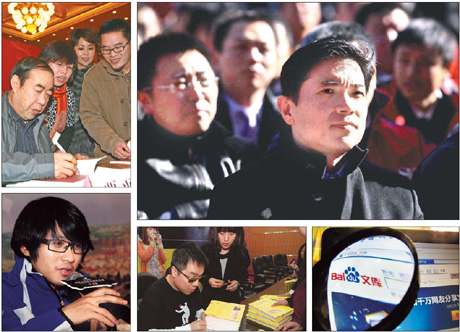War of the words over online piracy
Huang Shan mechanically switches on a palm-size gadget as the subway train's door shuts. Ghost Fighter, Chapter Two. Another 40-minute journey to work, and a horror story is the best way to kill time.
"The electronic book is my favorite travel companion," said Huang, 27, an English teacher at a Beijing language training school. "I download e-books from the Internet for free."
Huang's free ride could end soon, amid increasing battles between copyright holders and content-providing websites. Digital piracy, after already extracting a heavy toll from the film, music and software industries, now has publishing in its crosshairs.
|
|
|
About 50 writers and publishers are fighting search engine giant Baidu over its use of their works without permission through the online library Baidu Wenku. Those who signed an open letter of complaint include novelist Jia Pingwa (top left), blogger Han Han (bottom left) and Hong Kong movie director Pang Ho-cheung (bottom center, seated). Baidu's chief executive, Li Yanghong (top right) said he hopes to work out a mutually beneficial settlement. [China Daily] |
The latest row is between Baidu and a group of about 50 Chinese writers and publishers, including popular blogger Han Han, novelist Jia Pingwa and Hong Kong movie director Pang Ho-cheung.
The literary group signed and published a letter on March 15 claiming that the largest Chinese search engine provided their works for free download from its library, Baidu Wenku, without their permission.
Baidu Wenku, launched in 2009, allows its users to download and upload digital files for free. It is the uploaded files, submitted by users without filtering for copyright, that are proving most problematic.
The two sides negotiated on Thursday, but the talks broke down after 4.5 hours.
Baidu issued a statement on Saturday, apologizing for hurting "the feelings of some writers". It also promised to delete all rights-infringing materials over the following three days. The number of literary worksin thelibrarydropped from2.8million before negotiations to 168 late Tuesday afternoon.
Shen Haobo, a publisher and one of the writers' representatives, told China Daily on Sunday that the writers refused to accept Baidu's apology because it did not admit the site had engaged in piracy.
Han had complained Saturday on his blog, in an open letter to Baidu CEO Li Yanhong, because Baidu had refused to admit any act of copyright infringement and because writers generally earn very little for their works.
"Why are you still unwilling to spend even a pennyon the copyright that you take from our industry by force?" he wrote. "How do you expect writers and the publishing industry to survive?"
 0
0 







